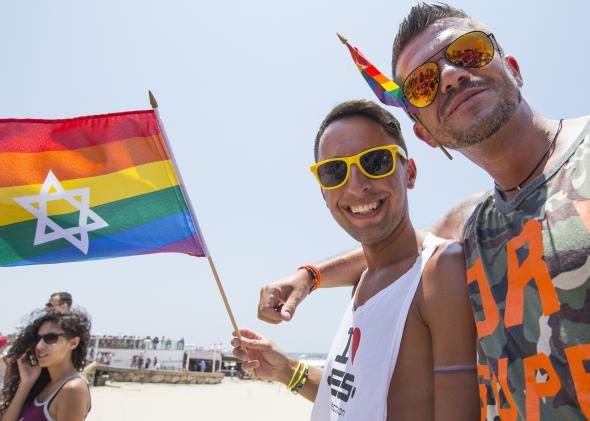Here we go again. Less than two years have passed since Israelis last went to the polls, but fractured by rancorous disputes over the budget, housing legislation, and a proposed law that would define Israel as a Jewish state, Benjamin Netanyahu’s center-right government collapsed earlier this month. The next election will take place on March 17, 2015.
While the most recent government was in many ways ineffectual, a product of the deep socio-political chasms that separated the various factions within it, the 19th Knesset was “one of the best parliaments” in Israel’s history for Israel’s LGBT community, says Shai Doitsh, the chairman of the Aguda, the Israeli National LGBT Task Force. “For the first time, LGBT rights were part of the coalition negotiations. That’s not a minor thing,” Doitsh said in a recent phone interview.
Doitsh made special note of the pro-LGBT positions propagated by centrist faction Yesh Atid. The health minister in the last government, Yesh Atid’s Yael German, passed bills banning discrimination in job applications on the grounds of gender identity and opening up surrogacy to same-sex couples. Through the finance ministry, which Yesh Atid controlled, same-sex couples with children were granted access to the same tax credits heterosexual parents are entitled to.
Looking forward to the next Knesset, although Netanyahu would like to make the forthcoming election about security, it currently appears that the main issues are socio-economic: housing, the cost of living, and social justice. The most recent Channel 99 poll found that the Zionist Camp—the center-left bloc led by Labor’s Yitzhak Herzog and Hatnua’s Tzipi Livni—leads Netanyahu’s Likud by two seats. A new center-right faction, Kulanu, led by former Likud minister Moshe Kahlon, is focusing on socio-economic issues and is currently projected to win 10 seats. Yesh Atid is polling around the same figure.
“There is no doubt that if the center-left win, Israel will become more pro-LGBT,” Doitsh, who recently toured the United States visiting LGBT rights organizations and campaigns, told me. It’s not that Netanyahu’s Likud is particularly anti-LGBT, but the Israeli political system demands coalition government, and a government led by Likud would need to be supported by religious Zionist and ultra-Orthodox factions, which would prevent the passage of pro-LGBT legislation. “A center-left coalition would be much better for the community,” said Doitsh.
The coming election features two intriguing LGBT subplots bubbling just beneath the surface. Amir Ohana, the chair of Likud’s LGBT group, is currently seeking a place on the party’s list. If selected, he would become the first openly gay candidate to run for the Knesset on the Likud ticket. While the left-wing Meretz faction has traditionally been the most pro-LGBT party in the Knesset—Nitzan Horowitz, the only openly gay Member of Knesset in the recently concluded term, is part of Meretz—today, Likud has one of the strongest LGBT groups.
Doitsh compared gay Likudniks to gay Republicans. “The LGBT community is part of every population within Israel: part of the left, center, and right; religious and secular. Members of the LGBT community are coming out of the closet as right-wing and are influencing Likud.”
On the other side of the political spectrum, Labor has been dogged by controversy surrounding one MK in particular, a gay man first elected to the Knesset in January 2013 who was referred to in a March 2013 Ha’aretz column by Aeyal Gross as Mr. X. Although he is known to be gay (Uzi Even, the first openly gay MK, once told me that Mr. X’s homosexuality can’t even be called an open secret since “everyone knows”), Mr. X made a deliberate choice to go back into the closet and hide his gay identity during his public career. Mr. X has abstained on votes of interest to the LGBT community, fuelling the community’s anger.
Writer and activist Gal Uchovsky—who has been scathing about Mr. X in the past—recently penned an open letter to Labor leader Yitzhak Herzog, calling on him to deal with the “elephant in the room” that is Mr. X by forcing him to come out or leave the Knesset. “Everyone should come out when they’re ready, in the right climate, and in their own time,” Doitsh said of Mr. X. “But this is a very unique case. This is not someone who’s been in the closet all of his life, who got elected while he was in the closet. This MK was part of the gay community until the day he was elected. He was out, he was dating, he had a boyfriend, and then he went back in the closet.”
Uchovsky can sometimes be “aggressive” in the way he words things, Doitsh acknowledged, but “his message is correct. [Uchovsky’s] publications reflect the fact that the gay community is mad about this. It sends the wrong message to youth that they should be ashamed about [being gay] and should go back into the closet.” Mr. X should come out, Doitsh concluded.
Israel, Doitsh says, is “by any definition one of the most pro-LGBT countries in the world,” noting the advances that were made during the 1990s on nondiscrimination in the military, the workplace, and in common-law marriage at a time when the United States was retreating on gay rights. Nevertheless, Doitsh believes this forthcoming election will be “critical” for the LGBT community. The center-left parties are already courting gay voters. The important thing is that LGBT Israelis turn out.
“People have to go out and vote. For too many elections in the last few years, the liberal, secular part of Israel either didn’t care or didn’t believe they had the ability to make a change.” The Aguda will soon launch a campaign to make LGBT voters—and liberal-minded voters generally—recognize that “we have the ability to make sure that Israel has the right parliament and government to take the LGBT community to a better place.”
